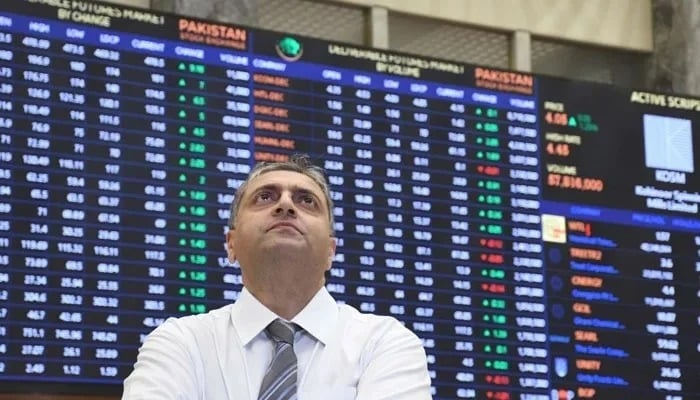Foreign investors, funds drive PSX to record high after testing 94,000 mark
KSE-100 index rises by 729 points during intra-day trading
Stocks on Monday hit a new record high after testing the 94,000-point resistance level, as foreign investors and money market funds forayed into the capital market, with government bonds losing charm amid the central bank's extended hawkish monetary policy regime.
The Pakistan Stock Exchange's (PSX) benchmark KSE-100 Shares Index closed at 93,648.32 points, up 356.64 points or 0.38% from the previous close of 93,291.68 points, after hitting an intraday high of 94,020.02 points.
Talking to Geo.tv, Ahsan Mehanti from Arif Habib Corp said stocks reached an all-time high, driven by blue-chip scrips, drawing foreign investors interest after the MSCI standard index weight was revised to 4.4%.
"Rupee stability and declining bank lending rates, following a slump in government bond yields, also spurred the bullish activity at the PSX," Mehanti added.
Last week, the MSCI announced changes in its global indices’ constituents, effective after the market close on November 25, 2024.
The MSCI small cap index has 399 constituents, out of which 67 (17% of the total) are from Pakistan with a weight of 10.5%.
Raza Jafri, CEO at EFG Hermes Pakistan, told Geo. tv that the energy sector was contributing most to the index's rise, complemented by a catch-up rise in some hitherto underperforming high beta stocks.
"So far, the market is defying nascent calls [for] a technical correction but it remains possible given the index's rapid ascent this quarter," the capital market expert said.
Moreover, market analysts have credited the recent upward momentum to a series of favourable macroeconomic factors. These include the State Bank of Pakistan's unprecedented 250 basis points reduction in the policy rate, bringing it down to 15%. Inflows of remittances from overseas workers also reached $3.1 billion in October 2024, offering further support to the nation's economy.
Moreover, the cut-off yields for the fixed-rate discounted (FRD) and fixed rental rate (FRR) Sukuk saw a marked decrease. The one-year FRD yield dropped 76 basis points to 10.99%. In the FRR category, cut-off yields fell to 11.5% for the three-year (-50bps), 12.1% for the five-year (-43bps), and 11.7% for the 10-year (-104bps) Sukuk bonds.
Samiullah Tariq, Group Head of Research and Product Development at Pakistan Kuwait Investment Company, attributed the rally to a strategic shift by money market funds from debt securities to equities.
"This transition is driven by declining interest rates and an improved economic outlook, making equities more attractive to investors," Tariq said.
Nonetheless, Intermarket Securities Limited in a report said that the key triggers to watch for the market would be the International Monetary Fund (IMF) mission's meeting this week.
The IMF mission will hold talks with Pakistan in the aftermath of major "deviations" on performance targets and urge Islamabad to introduce a mini-budget for course correction, The News reported on Thursday.
According to sources, IMF staff will travel to Pakistan between November 11 and 15 for a staff visit to discuss the recent developments and program performance to date. This mission is not a part of the first review under the EFF, which will be no earlier than the first quarter of 2025.
-
Bitwise Crypto Industry innovators ETF: What investors should do in 2026?
-
Nintendo shares slide again as momentum fears grow
-
Gold, silver prices fallen sharply; What’s driving the drop?
-
Gold’s record climb: Experts question if its safety is ‘overstated’
-
Dubai unveils plans to construct street built with real gold
-
Netflix slams Paramount’s bid: 'Doesn't pass sniff test’ as Warner battle escalates
-
Ubisoft: Shares plunge amid restructuring plan and wave of games cancellations
-
Netflix revises Warner Bros. deal to $83 billion: All-cash offer












